- Home
- Mario Puzo
Fools die Page 2
Fools die Read online
Page 2
They ate breakfast together often. And always had this late-afternoon drink before starting their big gambling action that would destroy the night. Sometimes they had a midnight snack to celebrate a win, the lucky man picking up the tab and buying keno tickets for the table. In the last three weeks they had become buddies, though they had absolutely nothing in common and their friendship would die with their gambling lust. But now, still not busted out, they had a strange affection for each other. Coming off a winning day, Merlyn the Kid had taken the three of them into the hotel clothing store and bought their crimson and blue Vegas Winner jackets. That day all three had been winners and had worn their jackets superstitiously ever since.
Jordan had met Diane on the night of her deepest humiliation, the same night he first met Merlyn. The day after meeting her he had bought her coffee on one of her breaks, and they had talked but he had not heard what she was saying. She sensed his lack of interest and had been offended. So there had been no action. He was sorry afterward, sorry that night in his ornately decorated room, alone and unable to sleep. As he was unable to sleep every night. He had tried sleeping pills, but they gave him nightmares that frightened him.
The jazz combo would be coming on soon, the lounge filled up. Jordan noticed the look they had given him when he had tipped the waitress with a red five-dollar chip. They thought he was generous. But it was simply because he didn’t want to be bothered figuring out what the tip should be. It amused him to see how his values had changed. He had always been meticulous and fair but never recklessly generous. At one time his part of the world had been scaled and metered out. Everyone earned rewards. And finally it hadn’t worked. He was amazed now at the absurdity of having once based his life on such reasoning.
The combo was rustling through the darkness up to the stage. Soon they would be playing too loud for anyone to talk, and this was always the signal for the three men to start their serious gambling.
“Tonight’s my lucky night,” Cully said. “I got thirteen passes in my right arm.”
Jordan smiled. He always responded to Cully’s enthusiasm. Jordan knew him only by the name of Cully Countdown, the name he had earned at the blackjack tables. Jordan liked Cully because the man never stopped talking and his talk rarely required answers. Which made him necessary to the group because Jordan and Merlyn the Kid never talked much. And Diane, the baccarat shill, smiled a lot but didn’t talk much either.
Cully’s small-featured, dark, neat face was glowing with confidence. “I’m going to hold the dice for an hour,” he said. “I’m going to throw a hundred numbers and no sevens. You guys get on me.”
The jazz combo gave their opening flourish as if to back Cully up.
Cully loved craps, though his best skill was at blackjack where he could count down the shoe. Jordan loved baccarat because there was absolutely no skill or figuring involved. Merlyn loved roulette because it was to him the most mythical, magical game. But Cully had declared his infallibility tonight at craps and they would all have to play with him, ride his luck. They were his friends, they couldn’t jinx him. They rose to go to the dice pit and bet with Cully, Cully flexing his strong right arm that magically concealed thirteen passes.
Diane spoke for the first time. “Jordy had a lucky streak at baccarat. Maybe you should bet on him.”
“You don’t look lucky to me,” Merlyn said to Jordan.
It was against the rules for her to mention Jordan ’s luck to fellow gamblers. They might tap him for a loan or he might feel jinxed. But by this time Diane knew Jordan well enough to sense he didn’t care about any of the usual superstitions gamblers worried about.
Cully Countdown shook his head. “I have the feeling.” He brandished his right arm, shaking imaginary dice.
The music blared; they could no longer hear each other speak. It blew them out of their sanctuary of darkness into the blazing stage that was the casino floor. There were many more players now, but they could move fluidly. Diane, her coffee break over, went back to the baccarat table to bet the house money, to fill up space. But without passion. As a house shill, winning and losing house money, she was boringly immortal. And so she walked more slowly than the others.
Cully led the way. They were the Three Musketeers in their crimson and blue Vegas Winner sports jackets. He was eager and confident. Merlyn followed almost as eagerly, his gambling blood up. Jordan followed more slowly, his huge winnings making him appear heavier than the other two. Cully was trying to sniff out a hot table, one of his signposts being if the house racks of chips were low. Finally he led them to an open railing and the three lined up so that Cully would get the dice first coming around the stickman. They made small bets until Cully finally had the red cubes in his loving rubbing hands.
The Kid put twenty on the line. Jordan two hundred. Cully Countdown fifty. He threw a six. They all backed up their bets and bought all the numbers. Cully picked up the dice, passionately confident, and threw them strongly against the far side of the table. Then stared with disbelief. It was the worst of catastrophes. Seven out. Wiped. Without even catching another number. The Kid had lost a hundred and forty, Cully a big three fifty. Jordan had gone down the drain for fourteen hundred dollars.
Cully muttered something and wandered away. Thoroughly shaken, he was now committed to playing very careful blackjack. He had to count every card from the shoe to get an edge on the dealer. Sometimes it worked, but it was a long grind. Sometimes he would remember every card perfectly, figure out what was left in the shoe, get a ten percent edge on the dealer and bet a big stack of chips. And even then sometimes with that big ten percent edge he got unlucky and lost. And then count down another shoe. So now, his fantastic right arm having betrayed him, Cully was down to case money. The night before him was a drudgery. He had to gamble very cleverly and still not get unlucky.
Merlyn the Kid also wandered away, also down to his case money, but with no skills to back up his play. He had to get lucky.
Jordan, alone, prowled around the casino. He loved the feeling of being solitary in the crowd of people and the gambling hum. To be alone without being lonely. To be friends with strangers for an hour and never see them again. Dice clattering.
He wandered through the blackjack pit, the horseshoe tables in straight rows. He listened for the tick of a second carder. Cully had taught him and Merlyn this trick. A crooked dealer with fast hands was impossible to spot with the eye. But if you listened very carefully, you could hear the slight rasping tick when he slid out the second card from beneath the top card of his deck. Because the top card was the card the dealer needed to make his hand good.
A long queue was forming for the dinner show though it was only seven. There was no real action in the casino. No big bettors. No big winners. Jordan clicked the black chips in his hand, deliberating. Then he stepped up to an almost empty crap table and picked up the red glittering dice.
Jordan unzipped the outside pocket of his Vegas Winner sports jacket and heaped black hundred-dollar chips into his table rack. He bet two hundred on the line, backed up his number and then bought all the numbers for five hundred dollars each. He held the dice for almost an hour. After the first fifteen minutes the electricity of his hot hand ran through the casino and the table jammed full. He pressed his bets to the limit of five hundred, and the magical numbers kept rolling out of his hand. In his mind he banished the fatal seven to hell. He forbade it to appear. His table rack filled to overflowing with black chips. His jacket pockets bulged to capacity. Finally his mind could no longer hold its concentration, could no longer banish the fatal seven, and the dice passed from his hands to the next player. The gamblers at the table gave him a cheer. The pit boss gave him metal racks to carry his chips to the casino cage. Merlyn and Cully appeared. Jordan smiled at them.
“Did you get on my roll?” he asked.
Cully shook his head. “I got in on the last ten minutes,” he said. “I did a little good.”
Merlyn laughed. “I didn’t believe i
n your luck. I stayed off.”
Merlyn and Cully escorted Jordan to the cashier’s cage to help him cash in. Jordan was astonished when the total of the metal racks came to over fifty thousand dollars. And his pockets bulged with still more chips.
Merlyn and Cully were awestricken. Cully said seriously, “Jordy, now’s the time for you to leave town. Stay here and they’ll get it back.”
Jordan laughed. “The night’s young yet.” He was amused that his two friends thought it such a big deal. But the strain told on him. He felt enormously tired. He said, “I’m going up to my room for a nap. I’ll meet you guys and buy a big dinner maybe about midnight. OK?”
The cage teller had finished counting and said to Jordan, “Sir, would you like cash or a check? Or would you like us to hold it for you here in the cage?”
Merlyn said, “Get a check.”
Cully frowned with thoughtful greed, but then noticed that Jordan ’s secret inner pockets still bulged with chips, and he smiled. “A check is safer,” he said.
The three of them waited, Cully and Merlyn flanking Jordan, who looked beyond them to the glittering casino pits. Finally the cashier reappeared with the saw-toothed yellow check and handed it to Jordan.
The three men turned together in an unconscious pirouette; their jackets flashed crimson and blue beneath the keno board lights above them. Then Merlyn and Cully took Jordan by the elbows and thrust him into one of the spoke like corridors toward his room.
A plushy, expensive, garish room. Rich gold curtains, a huge silver quilted bed. Exactly right for gambling. Jordan took a hot bath and then tried to read. He couldn’t sleep. Through the windows the neon lights of the Vegas Strip sent flashes of rainbow color, streaking the walls of his room. He drew the curtains tighter, but in his brain he still heard the faint roar that diffused through the huge casino like surf on a distant beach. Then he put out the lights in the room and got into bed. It was a good fake, but his brain refused to be fooled. He could not fall asleep.
Then Jordan felt the familiar fear and terrible anxiety. If he fell asleep, he would die. He desperately wanted to sleep, yet he could not. He was too afraid, too frightened. But he could never understand why he was so terribly frightened.
He was tempted to try the sleeping pills again; he had done so earlier in the month and he had slept, but only with nightmares that he couldn’t bear. And left him depressed the next day. He preferred going without sleep. As now.
Jordan snapped on the light, got out of bed and dressed. He emptied out all his pockets and his wallet. He unzipped all the outside and inside pockets of his Vegas Winner sports jacket and shook it upside down so that all the black and green and red chips poured down on the silk coverlet. The hundred-dollar bills formed a huge pile, the black and reds forming curious spirals and checkered patterns. To pass the time he started to count the money and sort out the chips. It took him almost an hour.
He had over five thousand dollars in cash. He had eight thousand dollars in black hundred-dollar chips and another six thousand dollars in twenty-five-dollar greens, almost a thousand dollars in five-dollar reds. He was astonished. He took the big jagged-edged Hotel Xanadu check out of his wallet and studied the black and red script and the numbered amount in green. Fifty thousand dollars. He studied it carefully. There were three different signatures on the check. One of the signatures he particularly noticed because it was so large and the script so clear. Alfred Gronevelt.
And still he was puzzled. He remembered turning in some chips for cash several times during the day, but he hadn’t realized it was for more than five thousand. He shifted on the bed and all the carefully stacked piles collapsed into each other.
And now he was pleased. He was glad that he had enough money to stay in Vegas, that he would not have to go on to Los Angeles to start his new job. To start his new career, his new life, maybe a new family. He counted all the money again and added the check. He was worth seventy-one thousand dollars. He could gamble forever.
He switched off the bedside light so that he could lie there in the darkness with his money surrounding and touching his body. He tried to sleep to fight off the terror that always came over him in this darkened room. He could hear his heart beating faster and faster until finally he had to switch the light back on and get up from the bed.
High above the city in his penthouse suite, the hotel owner, Alfred Gronevelt, picked up the phone. He called the dice pit and asked how much Jordan was ahead. He was told that Jordan had killed the table profits for the night. Then he called back the operator and told her to page Xanadu Five. He held on. It would take a few minutes for the page to cover all the areas of the hotel and penetrate the minds of the players. Idly he gazed out the penthouse window and could see the great thick red and green python of neon that wound down the Las Vegas Strip. And farther off, the dark surrounding desert mountains enclosing, with him, thousands of gamblers trying to beat the house, sweating for those millions of dollars of greenbacks lying so mockingly in cashier cages. Over the years these gamblers had left their bones on that gaudy neon Strip.
Then he heard Cully’s voice come over the phone. Cully was Xanadu Five. (Gronevelt was Xanadu One.)
“Cully, your buddy hit us big,” Gronevelt said. “You sure he’s legit?”
Cully’s voice was low. “Yeah, Mr. Gronevelt. He’s a friend of mine and he’s square. He’ll drop it back before he leaves.”
Gronevelt said, “Anything he wants, lay it on him. Don’t let him go wandering down the Strip, giving our money to other joints. Lay a good broad on him.”
“Don’t worry,” Cully said. But Gronevelt caught something funny in his voice. For a moment he wondered about Cully. Cully was his spy, checking the operation of the casino and reporting the blackjack dealers who were going partners with him to beat the house. He had big plans for Cully when this operation was over. But now he wondered.
“What about that other guy in your gang, the Kid?” Gronevelt said. “What’s his angle, what the hell is he doing here three weeks?”
“He’s small change,” Cully said. “But a good kid. Don’t worry, Mr. Gronevelt. I know what I got riding with you.”
“OK,” Gronevelt said. When he hung up the phone, he was smiling. Cully didn’t know that pit bosses had complained about Cully’s being allowed in the casino because he was a countdown artist. That the hotel manager had complained about Merlyn and Jordan’s being allowed to keep desperately needed rooms for so long despite fresh loaded gamblers who came in every weekend. What no one knew was that Gronevelt was intrigued by the friendship of the three men; how it ended would be Cully’s true test.
In his room Jordan fought the impulse to go back down into the casino. He sat in one of the stuffed armchairs and lit a cigarette. Everything was OK now. He had friends, he had gotten lucky, he was free. He was just tired. He needed a long rest someplace far away.
He thought, Cully and Diane and Merlyn. Now his three best friends, he smiled at that.
They knew a lot of things about him. They had all spent hours in the casino lounge together, gossiping, resting between bouts of gambling. Jordan was never reticent. He would answer any question, though he never asked any. The Kid always asked questions so seriously, with such obvious interest, that Jordan never took offense.
Just for something to do he took his suitcase out of the closet to pack. The first thing that hit his eye was the small hand gun he had bought back home. He had never told his friends about the gun. His wife had left him and taken the children. She had left him for another man, and his first reaction had been to kill the other man. A reaction so alien to his true nature that even now he was constantly surprised. Of course, he had done nothing. The problem was to get rid of the gun. The best thing to do was to take it apart and throw it away piece by piece. He didn’t want to be responsible for anybody’s getting hurt by it. But right now he put it to one side and threw some clothes in the suitcase, then sat down again.
He wasn’t that sure he
wanted to leave Vegas, the brightly lit cave of his casino. He was comfortable there. He was safe there. His not caring really about winning or losing was his magic cloak against fate. And most of all, his casino cave closed out all the other pains and traps of life itself.
He smiled again, thinking about Cully’s worrying about his winnings. What, after all, would he do with the money? The best thing would be to send it to his wife. She was a good woman, a good mother, a woman of quality and character. The fact that she had left him after twenty years to marry her lover did not, could not, change those facts. For at this moment, now that the months had passed, Jordan saw clearly the justice of her decision. She had a right to be happy. To live her life to its fullest potential. And she had been suffocating living with him. Not that he had been a bad husband. Just an inadequate one. He had been a good father. He had done his duty in every way. His only fault was that after twenty years he no longer made his wife happy.
His friends knew his story. The three weeks he had spent with them in Vegas seemed like years, and he could talk to them as he could never talk to anyone back home. It had come out over drinks in the lounge, after midnight meals in the coffee shop.
He knew they thought him cold-blooded. When Merlyn asked him what the visitation rights were with his children, Jordan shrugged. Merlyn asked if he would ever see his wife and kids again, and Jordan tried to answer honestly. “I don’t think so,” he said. “They’re OK.”
And Merlyn the Kid shot back at him, “And you, are you OK?”
And Jordan laughed without faking it, laughing at the way Merlyn the Kid zeroed in on him. Still laughing, he said, “Yeah, I’m OK.” And then just once he paid the Kid off for being so nosy. He looked him right in the eye and said coolly, “There’s nothing more to see. What you see is it. Nothing complicated. People are not that important to other people. When you get older, that’s the way it is.”

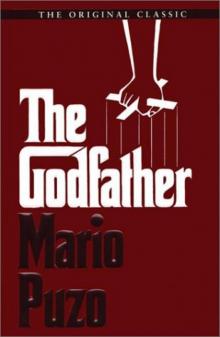 The Godfather
The Godfather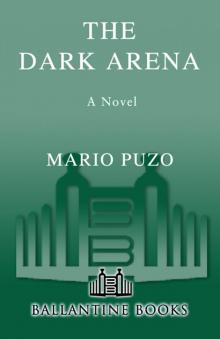 The Dark Arena
The Dark Arena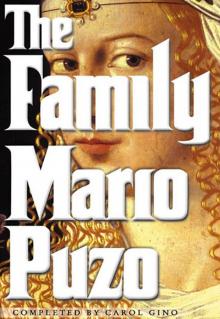 The Family
The Family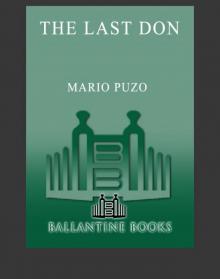 Last Don
Last Don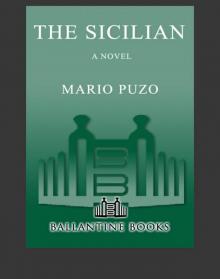 The Sicilian
The Sicilian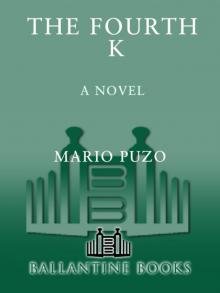 The Fourth K
The Fourth K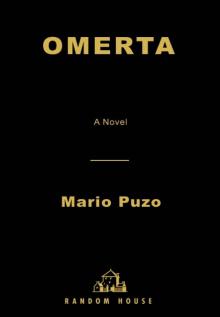 Omerta
Omerta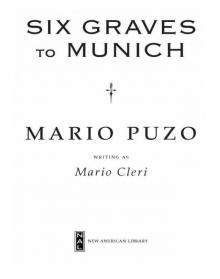 Six Graves to Munich
Six Graves to Munich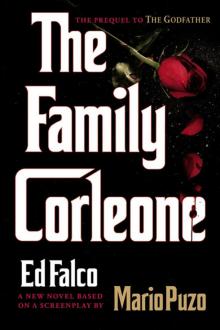 The Family Corleone
The Family Corleone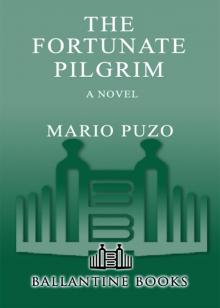 The Fortunate Pilgrim
The Fortunate Pilgrim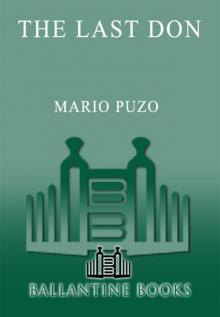 The Last Don
The Last Don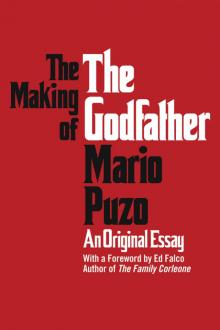 The Making of the Godfather
The Making of the Godfather Fools die
Fools die The Sicilian (v2.0)
The Sicilian (v2.0)